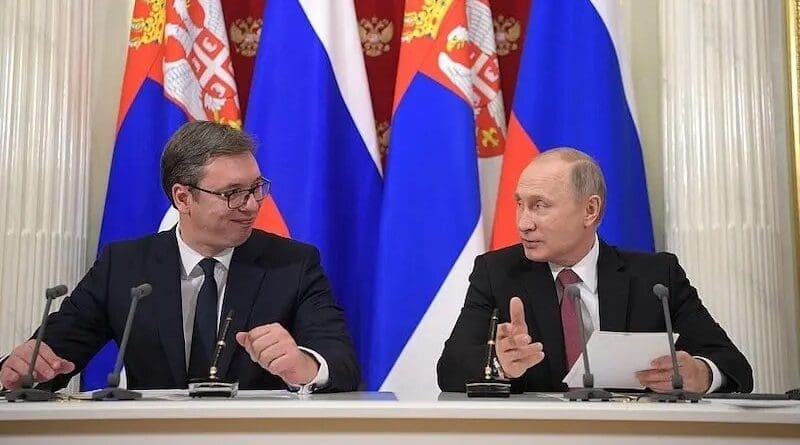Serbia: President Vucic Woos World Leaders Over Kosovo
By Maja Zivanovic
Aleksandar Vucic has undertaken a frenetic diplomatic offensive lately – pressing Serbia’s case in its worsening feud with Kosovo on a range of world leaders.
Serbian President Vucic has embarked on a relentless round of diplomatic meetings in recent weeks to lobby for Serbian interests in its long-term dispute with and over Kosovo.
His meetings with world officials came into the spotlight again after the former Foreign Minister and now opposition leader Vuk Jeremic said in March that the President – one week before – had “tried to hire a fabulously expensive lobbying company, which has not yet responded to him, about whether it was ready to accept an engagement to represent him in America” – during his recent visit to New York.
“I ask Vucic, which company it is, what is the price of their potential engagement, and if they agree to represent him, who will pay for this service?” asked Jeremic, known for his expertise in international relations, speaking to the weekly magazine, Vreme.
Vucic confirmed that he was in New York, but claimed he was on a private visit, and denied meeting with any lobbyists, adding that he had gone to the US with his daughter, as her mother was sick.
“I got on the plane with people, a regular flight … with 270 people. Then, one [person] insulted me, even though he saw I was with a kid, with my daughter, and [sent information] to everyone, and said this is the psychopath,” Vucic told Blic daily on March 21.
Vucic added that on his American visit he was just “an ordinary man, walking in New York at 1.30am and 2am, visiting bookstores”.
Jeremic also claimed that before his US trip, Vucic had met Kosovo President Hashim Thaci, in Paris – which Vucic denied as well.
However, the President’s intention to use his visit to the US to lobby for Serbia over Kosovo became clear after his office on March 22 revealed that he had, in fact, besides visiting bookstores, met the UN Secretary General, Antonio Guterres.
After the meeting, Vucic’s press office announced that the two officials had discussed the situation in the region and the state of the now stalled EU-led dialogue between Belgrade and Pristina.
Kosovo proclaimed independence from Serbia in 2008, having de facto broken away in 1999 as a result of NATO’s air war on Serbia. Most Western countries, including the US, recognised Kosovo long ago, but Kosovo’s statehood is still bitterly contested Serbia and Russia, among others.
In a report on March 20, Blic described Vucic’s trip to New York as a “continuation of his diplomatic offensive [on Kosovo], which has already been going on for a long time”.
Quoting sources, it added that the President was “trying to explain to the ambassadors of various countries in the UN … the situation regarding Kosovo and the position of Serbia”.
Vucic used another opportunity to bring the Kosovo issue to the fore after the presidential elections in Russia, which Vladimir Putin won.
After a telephone conversation in which Vucic congratulated him on his victory, Putin had “condemned the provocative actions of the Pristina authorities in Kosovska Mitrovica”, Vucic’s office reported.
The message was referring the arrest of Serbian state official in Kosovo on March 26. Kosovo police detained and expelled the head of the Serbian government’s Office for Kosovo, Marko Djuric, for entering Kosovo despite a ban on his presence.
The press release from Vucic’s office added that Putin had told Vucic that the Russia was “closely monitoring events in Kosovo, and strongly condemned Pristina’s actions and violence against the Serbian people”.
Days later, Vucic officially met EU foreign policy chief Federica Mogherini – and Kosovo President Thaci. Vucic then accused his counterpart in Kosovo of not fulfilling the conditions of the Brussel Agreement, starting with the establishment of an autonomous Association of Serbian Municipalities.
After this meeting, the President announced he would soon also meet Wess Mitchell, US Assistant Secretary of State for European and Eurasian Affairs.
This would not be Mitchell’s first meeting with Vucic, as the two officials already met in Belgrade on March 14.
“Mitchell, unlike many others, wanted to hear what the Serbian side had to say,” the Serbian President said, while admitting that that two officials had very different points of view on Kosovo.
Although no new meeting with Mitchell has happened so far, Vucic met German Chancellor Angela Merkel on April 13.
“You can call me whenever you want,” Vucic said Merkel told him after the meeting – adding that a final resolution of the Serbia-Kosovo issue would need the consent of Germany, France, the EU, America, Turkey and Russia, while China should be also notified.
He also claimed that he “was not sleeping at night because of Kosovo”.
On April 10, meanwhile, in Mostar, Bosnia, he met Bulgarian Prime Minister Boyko Borissov.
One day later, he met French Foreign Minister Jean-Yves Le Drian. Vucic said that after this meeting that two officials went “point by point” through the Brussel Agreement.
This is not the end of Vucic’s diplomatic whirlwind, moreover. It has been announced that on May 7, he will meet Turkish President Recep Tayyip Erdoğan as well.

